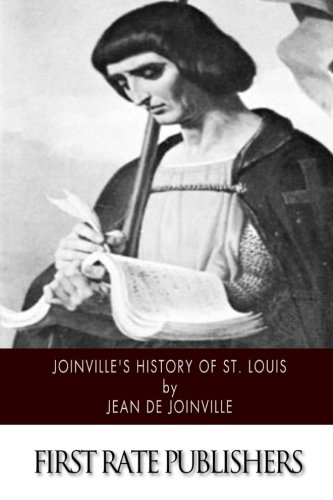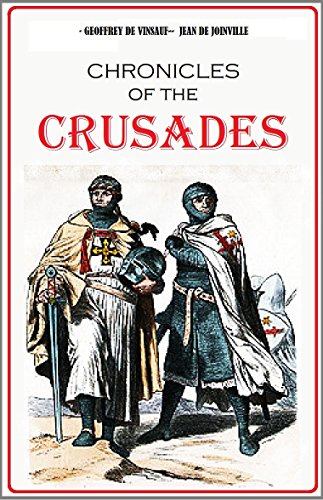Background
Jean de Joinville was born in the second half of 1224 or the first months of 1225, in Champagne, France, to Simon de Joinville and Beatrice d'Auxonne.



(Excerpt from Saint Louis, King of France The second part...)
Excerpt from Saint Louis, King of France The second part of the book speaks of his great chi valry and great deeds of arms. Sire, because it is written: Do first what belongs unto God, and He will direct all thy other works, I have caused to be written what pertains to the three things above-named that is to say, what pertains to the profit of soul and of body, and what pertains to the government of the people. About the Publisher Forgotten Books publishes hundreds of thousands of rare and classic books. Find more at www.forgottenbooks.com This book is a reproduction of an important historical work. Forgotten Books uses state-of-the-art technology to digitally reconstruct the work, preserving the original format whilst repairing imperfections present in the aged copy. In rare cases, an imperfection in the original, such as a blemish or missing page, may be replicated in our edition. We do, however, repair the vast majority of imperfections successfully; any imperfections that remain are intentionally left to preserve the state of such historical works.
http://www.amazon.com/gp/product/1333283210/?tag=2022091-20

(Jean de Joinvilles Joinvilles History of Saint Louis is...)
Jean de Joinvilles Joinvilles History of Saint Louis is a contemporary account of one of the most revered French rulers in the Middle Ages. As noted in the opening words: The life of St. Louis, written by the lord de Joinville, has always been considered as one of the most precious monuments of our history and as a work that contains many of those qualifications which we are accustomed to wish for in the lives of private persons. The author was of very considerable rank by his birth, his connections, his employments, and still more from his personal merit. He had not only lived under the reign of the prince whose life he has written, but was moreover personally attached to him for twenty-two years, and, by consequently following him in his expeditions, had participated in the most, important events of his reign. The air of candor and good faith that accompanies his recitals prejudices the reader in his favor; the scrupulous attention he shows not to mention facts of which he was not a witness, and only to touch on such as he relates from the report of others, as his history requires this attention, I repeat, ought to convince us, that the lord Joinville had no other intention than to transmit to posterity nothing but what he was perfectly well informed of. His history is not, like the greater part of the chronicles of those times, a simple recital of what passed in France and elsewhere during the reign of St. Louis; it makes us intimately acquainted with that monarch it gives us a just idea of his heart and head, and paints equally well the great man, the great saint, and the great king.
http://www.amazon.com/gp/product/1500906131/?tag=2022091-20

(Rare insights into the chivalric age through the eyewitne...)
Rare insights into the chivalric age through the eyewitness accounts of two French knights Chronicle of the Fourth Crusade and The Conquest of Constantinople by Geoffrey de Villehardouin Chronicle of the Crusade of St. Louis by Jean de Joinville Geoffrey de Villehardouin was an eminent French knight, who set out on the Fourth Crusade in 1199. Pivotally involved in events, including the routing the campaign via Constantinople, his important chronicle was written when his experiences were still fresh in his mind. After the conquest of Byzantium he became a military leader and earned the city of Messinopolis in Thrace and the title Marshal of Champagne. Jean de Joinville embarked upon his crusade-remembered by history as the Seventh Crusade-as a young man in 1248. This Crusade was launched only seven years after the previous one failed and actually managed to briefly occupy Jerusalem. De Joinville was away upon campaign for six years, returning home from Palestine in 1254, though he did not pen his memoir until old age. This is a very 'human ' reporter full of fears, misgivings and able to provide the reader with minute detail of events. This book contains two essential, first hand accounts from the time of the crusades, and gives the reader the rare opportunity to look into the lives of medieval knights on campaign and on the battlefield; both accounts are regarded as important documents of the period.
http://www.amazon.com/gp/product/1846778158/?tag=2022091-20

(Two famous, firsthand accounts of the holy war in the Mid...)
Two famous, firsthand accounts of the holy war in the Middle Ages translated by Caroline Smith Originally composed in Old French, the two chronicles brought together here offer some of the most vivid and reliable accounts of the Crusades from a Western perspective. Villehardouin's Conquest of Constantinople, distinguished by its simplicity and lucidity, recounts the controversial Fourth Crusade, which descended into an all-out attack on the E astern Christians of Byzantium. In Life of Saint Louis, Joinville draws on his close attachment to King Louis IX of France to recall his campaigning in the Holy Land. Together these narratives comprise a fascinating window on events that, for all their remoteness, offer startling similarities to our own age. For more than seventy years, Penguin has been the leading publisher of classic literature in the English-speaking world. With more than 1,700 titles, Penguin Classics represents a global bookshelf of the best works throughout history and across genres and disciplines. Readers trust the series to provide authoritative texts enhanced by introductions and notes by distinguished scholars and contemporary authors, as well as up-to-date translations by award-winning translators.
http://www.amazon.com/gp/product/0140449981/?tag=2022091-20

(The individual narratives brought together here reveal in...)
The individual narratives brought together here reveal insight into the two hundred year struggle for possession of Jerusalem, in the words of two soldiers who participated first-hand in the bloody campaigns. Geffroy de Villehardouin (1150-1212) was an appointed marshal of Champagne, France, whose "Conquest of Constantinople" recounts the controversial Fourth Crusade of 1204, against Eastern Christians in the Latin empire of Constantinople. Jean de Joinville (1224-1317) inherited the office of seneschal of Champagne at a young age, and wrote "Life of Saint Louis" after having accompanied King Louis IX on his first crusade and later living as a friend in his court. These accounts, originally composed in Old French, are considered to be some of the most accurate portrayals of the Crusades, and give fascinating insight into the religious and political fervor that sparked centuries of brutal battles and the struggle for holy conquest. This book published in 1903 has been reformatted for the Kindle and may contain an occasional defect from the original publication or from the reformatting.
http://www.amazon.com/gp/product/B00UDV11X6/?tag=2022091-20
historian author monarch nobleman
Jean de Joinville was born in the second half of 1224 or the first months of 1225, in Champagne, France, to Simon de Joinville and Beatrice d'Auxonne.
He received an education befitting a young noble at the court of Theobald IV, count of Champagne: reading, writing, and the rudiments of Latin.
On the death of his father in 1233, he became lord of Joinville and seneschal of Champagne (and was therefore personally connected to Theobald IV).
He was 17 when he attended with his overlord, the poet Thibaut de Champagne, the feast at Saumur in 1241. When Louis IX left on the Seventh Crusade, Joinville dutifully followed him to Egypt and Palestine and fought there, but he had little enthusiasm for military action. After the taking of Damiette in 1249, the only real success of the whole expedition, Joinville and the King were taken prisoners and shared certain perils until they were released by ransom. In 1254 Joinville was back home, occupying himself with administrative duties. When Louis set off for the Eighth Crusade, Joinville begged off on the grounds that his duty was to protect his people at home.
About 1305 Jeanne de Navarre asked Joinville to write his memoirs of Louis, but she was long dead by the time the old gentleman had dictated his Livre des saintes paroles et des bons faiz nostre roy saint Looys (Life of Saint Louis), dedicated in 1309 to the Dauphin. The events recorded are recalled with remarkable accuracy and clarity.
The Life of Saint Louis, written with no idea of publication, is perhaps the most personal series of reminiscences that have come down from Louis's century. Unlike the more formal histories, this little book is subjective. The first part is concerned with the exemplary integrity and virtue of its subject. The second contains a sympathetic account of his career from his birth (1214) and coronation (1226), emphasizing naturally the Seventh Crusade with a frankness that includes the King's fears and reveals a rather ill-conducted campaign. The last chapters tell of Louis's second crusade, his illness and death (1270), and Joinville's participation in the canonical inquiries that led to the canonization of Louis. Joinville's other writings include a devout commentary on the Credo, which shows considerable scriptural knowledge, a pious epitaph on his forebears, and a few letters.
Joinville died on December 24, 1317, over 93 years old, nearly fifty years after the death of Louis.
(Two famous, firsthand accounts of the holy war in the Mid...)
(Rare insights into the chivalric age through the eyewitne...)
(The individual narratives brought together here reveal in...)
(Jean de Joinvilles Joinvilles History of Saint Louis is...)
(Excerpt from Saint Louis, King of France The second part...)
Quotations: "When the Saracens came to attack him, they threw Greek fire onto the barrier he had made; and the fire caught easily, and you should know that the Turks did not wait for the fire to burn itself out, but rushed upon the Templars among the scorching flames. "
He was a very pious man and was concerned with the proper administration of the region.
On August 11, 1230, Jean de Joinville married Alix de Grandpré, they had two sons. In 1261 he married Alix de Reynel, they had four children.
Geoffroy de Joinville was Lord Montclair.
Geoffroy de Joinville was an Anglo-French noble, supporter of Henry III, who appointed him Baron of Trim, County Meath, and, subsequently, a staunch supporter of Edward I.
